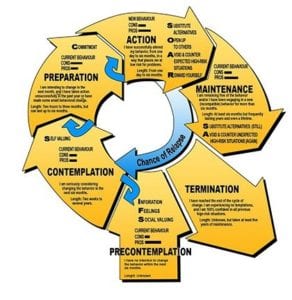

As I travel the new road facing my depression, it is clear the path is not straight.
As I read and learn more about depression, I ran across the concept of stages of change.
Currently, I am reading the SMART Recovery Handbook. It reminds me that it’s difficult to change long-standing behaviors, even when new ones are better for you. Depression has a way of making these new behaviors appear bad while reinforcing its own destructive agenda.
I have seen this in my personal journey towards recovery and a better life. My recovery from the grip of depression has spanned decades and has been a wild ride, with unexpected twists and turns. Unexpected mostly because I was unaware of the fact that I had depression and too afraid to investigate my downward excursions because I might have to face myself.
This fear of facing myself kept me in depression’s embrace.
I did not see a way out. Now that I have accepted and embraced the same depression that has held me all these years, I finally see I have choices. And these choices create change. This is exciting. To think that I really have control of my thoughts and how I think about circumstances and events is empowering.
According to SMART Recovery, there are five stages of change.
The Stages of Change
1) PRECONTEMPLATION STAGE
“It isn’t that we cannot see the solution. It’s that we cannot see the problem.”
Precontemplators usually show up in therapy because of pressures from others… spouses, employers, parents, and courts… Resist change. When their problem comes up, they change the topic of conversation. They place responsibility for their problems on factors such as genetic makeup, addition, family, society, destiny, the police, etc. They feel the situation is HOPELESS.
2) CONTEMPLATION STAGE
“I want to stop feeling so stuck!”
Contemplators acknowledge that they have a problem and begin to think about solving it. Contemplators struggle to understand their problems, to see its causes, and wonder about possible solutions. Many contemplators have indefinite plans to take action within the next few months.
“You know your destination, and even how to get there, but you’re not ready to go.”
It is not uncommon for contemplators to tell themselves that someday they are going to change. When contemplators transition to the preparation stage of change, their thinking is clearly marked by two changes. First, they begin to think more about the future than the past.
The end of contemplation stage is a time of ANTICIPATION, ACTIVITY, ANXIETY, and EXCITEMENT.
3) PREPARATION STAGE
Most people in the preparation stage are planning to take action and are making the final adjustments before they begin to change their behavior. Have not yet resolved their AMBIVALENCE. Still need a little convincing.
4) ACTION STAGE
Stage where people overtly modify their behavior and their surroundings. Make the move for which they have been preparing. Requires the greatest commitment of time and energy.
CHANGE IS MORE VISIBLE TO OTHERS.
5) MAINTENANCE STAGE
Change never ends with action. Without a strong commitment to maintenance, there will surely be relapse, usually to precontemplation or contemplation stage.
Most successful self-changers go through the stages three or four times before they make it through the cycle of change without at least one slip. Most will return to the contemplation stage of change. Slips give us the opportunity to learn.
(Thank you SMART Recovery for this illuminating information)
I have taken the plunge. I am finally at stage four, ACTION.
The fact that it took 43 years to get to this point is not as important as the fact that I have gotten to this point. Even with my most recent collision with depression, I could have chosen denial again. I could have run away and not faced depression. But I did not run, I did not turn my back. Instead, I choose to face my fears and depression.
This time I said, “I have depression, depression does not have me.”
My Action started in the controlled environment of inpatient treatment. After four days, I began working with a therapist, a trained professional counselor. I am attending mutual help groups and am taking an active role in my own recovery as I try new ways to handle old situations, uncomfortable emotions, urges, and other challenges.
As it says in the SMART recovery book I am reading, “this stage requires the greatest commitment of time and energy but is also where new changes start to be visible to others.”
My journey continues and I am excited to see and feel the progress I am making. Developing new habits, new ways of thinking is not an overnight change. But I am committed to the path, to the journey and to the idea that what I did for 43 years was not working and that taking action towards a new life is worth the anxiety and discomfort.
On this path, I will achieve my long-term goals.
Your comments, likes, and shares are appreciated as I continue my journey.







Very illuminating information! Good luck on your journey.
Thank you. I am excited that I am finally addressing my depression. While there is still a lot to learn, I feel more confident about my future than ever before.